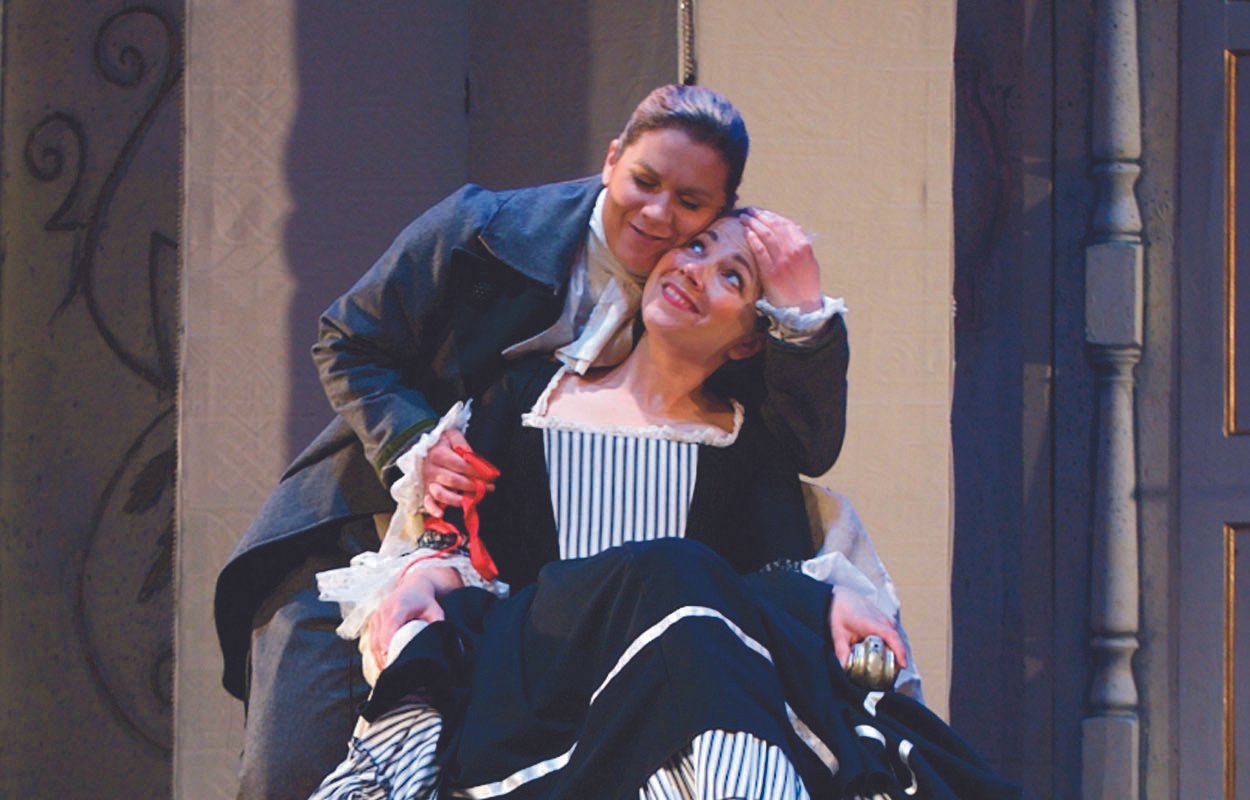
Mozart's The Marriage of Figaro
Opera Brava's production of Mozart's
The Marriage of Figaro

synopsis
Set in the eighteenth century, the opera follows the amorous intrigues in the chateau of Count Almaviva in Seville,on the day before the wedding between his two servants, Figaro and Susanna.
act i
A PARTLY-FURNISHED BEDROOM
Figaro is measuring the space for their marital bed while his fiancée, Susanna, tries on a hat for the wedding. He tries to persuade her that their room will be ideally placed between their two employers’ apartments in the chateau, but she points out that it is the Count that has chosen the room, well placed as it is for him to exercise the hated droit de seigneur (by which the master took the virginity of every young bride on his estate). Figaro - incensed - vows to outwit his master, the Count. Matters are complicated by the arrival of Doctor Bartolo with Marcellina, who claims that Figaro is contracted to marry her, not Susanna. The two women exchange insults and part badly. The teenage Cherubino comes in to tell Susanna that the Count has banished him from the house, and he is distraught at the prospect of being so far from the Countess, with whom he is infatuated. When Count Almaviva arrives, Cherubino hides behind a chair and overhears the Count demanding a tryst with Susanna in the garden at dusk. The tension mounts when Basilio is heard approaching; the Count, not wishing to be found alone with Susanna, now also hides while Cherubino, unobserved, quickly climbs into the chair and is concealed by Susanna with a rug. Basilio hints that Cherubino is in love with the Countess, causing the Count to leave his hiding place in a furious rage, explaining how he has already discovered the amorous young boy with Barberina, the gardener’s daughter. He demonstrates this earlier discovery by whisking the rug from the chair, only to find the young culprit once again. In comes Figaro and others at that moment, and they try to mollify the Count by praising his action in abolishing the droit de seigneur, which the furious Almaviva is very reluctant to do. The Count decides to commission Cherubino as a young officer in his regiment and Figaro tells the boy how different life will be as a soldier.
act ii
THE COUNTESS’S CHAMBER IN THE CHATEAU
Alone, the Countess reflects on her marriage and sighs for the return of her husband’s love. Susanna has told her of the Count’s planned assignation, and Figaro tells them both of his plan to prevent the Count’s seduction of Susanna: they should disguise Cherubino so that he can take Susanna’s place in the garden. A blushing Cherubino is persuaded by the two women to sing the song he has composed, and - believing the Count to be away for some hours - they amuse themselves fitting Cherubino into his disguise. When the Count comes back unexpectedly, Cherubino locks himself in the dressing room. The Count accuses his wife of having a lover, waving a note he has received from Basilio to that effect. A noise from the dressing room does nothing to calm his temper while the Countess claims that it is only Susanna behind the locked door. A furious Count takes his wife with him to find tools to force the door, locking his wife’s bedroom door behind him. While they are gone, Susanna persuades Cherubino to open the dressing room door, and he jumps from the bedroom window into the garden below. When the Count and Countess return, the Count is much put out when it is Susanna who opens the door and comes out. Figaro joins them but is slow to understand the goings on, and then Antonio, the gardener arrives to complain about the damage done to his flower beds. The act ends as Marcellina, Bartolo and Basilio storm in to plead the older woman’s claim to Figaro’s hand in marriage.
act iii
IN THE COUNT’S ROOMS
The Count is understandably perplexed by the day’s events. The Countess persuades Susanna to go to the Count and agree to his request, Susanna hoping later that she can persuade the Count to reject Marcellina’s claim. The Count overhears this and vows to avenge himself on Figaro by forcing him to marry the older woman. Figaro (who is a foundling), pleads the need for parental consent, and when, it turns out that his parents are none other than the unmarried Marcellina and Bartolo, there is great rejoicing and plans for a double wedding. The Countess dictates to Susanna an invitation for the Count to meet her in the garden that evening, and seals it with a pin to be returned to Susanna by way of a reply. Cherubino, disguised as a village girl comes in with Barbarina to present flowers to the Countess, but the boy is unmasked by Antonio and the Count. He is forgiven after Barbarina pleads for him, reminding the Count of his own flirtatious behaviour towards her, and she presses the Count to allow her to marry Cherubino, with a promise to continue her own assignations with the Count. The wedding ceremony begins and the Count opens Susanna’s note…
act iv
THE GARDEN LATER THAT NIGHT
Barbarina cannot find the pin she was to return to Susanna, and naively tells the unknowing Figaro that it is Susanna that the Count will meet. A jealous Figaro warns all husbands of the wiles of women, and hides in the bushes to catch the pair. Susanna and the Countess then arrive, disguised as each other; knowing that Figaro is in earshot, Susanna wants to punish him for doubting her and pretends to long for the Count’s presence. The Countess, awaits the Count, but it is Cherubino, on his way to meet Barbarina that discovers her. Believing her to be Susanna, he starts to flirt with her, only to be disturbed by the Count. Cherubino escapes in the dusk, and the Count starts his wooing of the woman he believes to be Susanna. Figaro watches appalled, and finally disturbs the love scene. It is the Countess’s turn to hide, the Count promising to return at a better moment. Susanna arrives, still dressed as the Countess, but Figaro soon sees through the disguise, they are reconciled, and plan to trap the Count when he returns. The Count arrives to find, as he thinks, his valet making love to the woman he takes to be his wife. The outraged Count calls on everyone to witness his wife’s supposed infidelity, but is mortified when the real Countess comes out of hiding. The chastened Count begs her forgiveness, and the madness ends in an evening of compassion and festivity.

